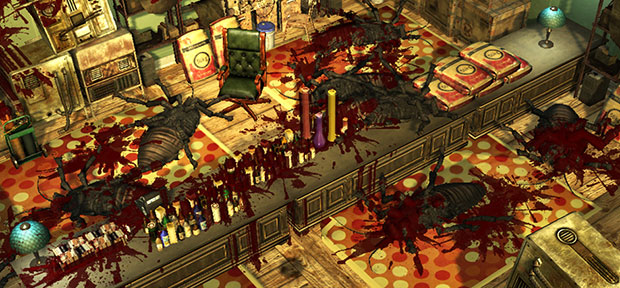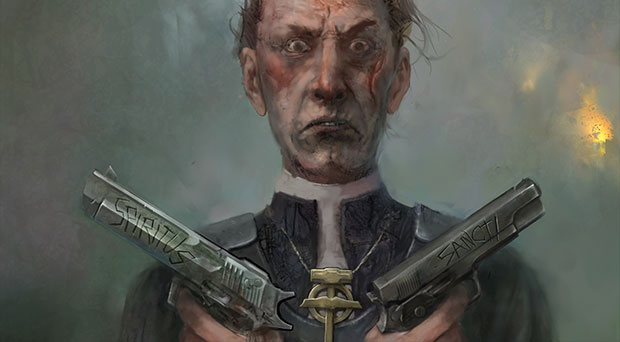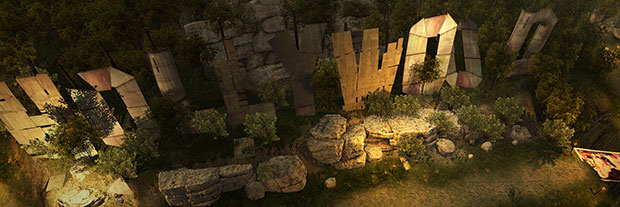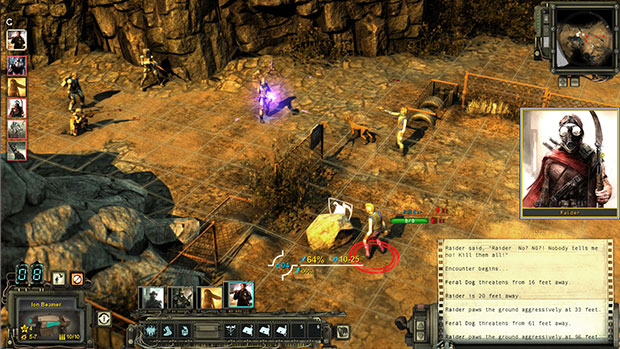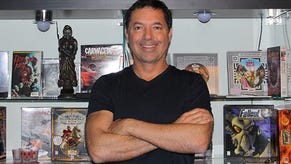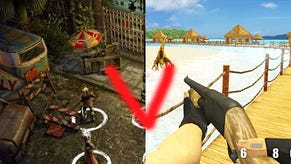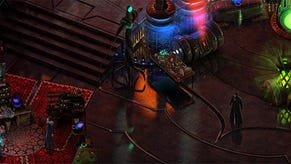Wasteland 2: Fargo On NPCs, DLC & Save-Scumming
"We try to make things behave correctly as much as we can"
When I sat down for a chat with Wasteland 2's Brian Fargo (he of Interplay as-was, and now of InXile as-is), it wasn't yet known that the Kickstarted alterna-Fallout RPG was to have its release date moved from August to September. Hence, I didn't ask him about that. But we did talk about the state the game's in now, what post-release plans are, sneaking recordings of his revivalist preacher granddad onto the soundtrack, mysterious NPCs, butterfly effect consequences and the importance of continuity.
RPS: You're basically finished now?
Brian Fargo: We're in the final stretch. We're gonna give an update tomorrow or the next day, which is pretty darn representative of the Arizona section of the game. That goes out to all the beta testers. All we're really doing at this point – because we have very few critical error bugs remaining – is adding more polish. We make changes all the way to the last second, so it's adding particle effects, adding more variants of things going on, messaging things better, typos, lots of little things. That's all going to happen over the next four to five weeks. You can play the whole game start to finish, everything's in there now, we're just in the final stretch.
RPS: What will "finished" mean for a game like this, released like this? Presumably it won't just be washing your hands of it bar a couple of patches?
Brian Fargo: Oh, I think those days are over. There's no such thing as "you're just done." There'll always be follow-on support, although we're somewhat fortunate that, because it's been a beta tested game since December, we've dealt with so many of the compatibility issues and so many of the things that you would usually have post-launch. But no doubt they'll found things, but also we want to add some other content later for free, to keep it fresh and exciting for people who paid us for it. Then we're going to be putting out some mod tools also. That's a mini-project into itself, that's going to create a whole series of lovely problems.
I wouldn't mind doing an expansion pack. We're going to consider it, but we just look at our resources because we're a small company, we've got to get Torment done, some people would love to see a console version. So we've got to look at all the things and what we can spend. There'll be definitely be add-on support and add-on content one way or the other. It might just be free.
RPS: And you've got to make the Red Boots DLC still, of course. [This is an in-game joke – Exposition Ed]
Brian Fargo: That's very expensive to make, too. That's why it's $60. We got to put a lot of effort into that [laughs].
RPS: I wonder how many people clicked on that link, despite the crazy price.
Brian Fargo: I don't know, but I did see one time where somebody posted about how outrageous it was. They were all "see, this is the kind of thing they're doing, right off the bat, charging $60 for DLC." Of course, the other users just shredded the person. He just went away and pretended he hadn't said anything. Did you ever see that NPR thing that proves nobody ever reads beyond the headline? They gave some weird headline, and the body said ignore the headline, it was just attached to see if anyone reads anything, then all the comments were just about the headline. It's the nature of the beast.
RPS: You were saying about how many bugs the community had identified for you – is that stuff removing the need for QA?
Brian Fargo: Oh, we have quite a big QA team, we have a whole group in Poland that's helping us to do QA. Remember, on the LA map side, that isn't in the public yet, so we've had to throw a bunch of bodies at that. Even on the Arizona side of it, we still have it, because we can say "we need you to play through the game and shoot everyone," because that's a different play experience. Most people who play it are trying to play in a more normal fashion, so we'll dictate that QA play it in certain ways. Plus there's ourselves, a small team internally, but there's a lot externally. We do regression tracking and all that, there's a whole science to keeping it bug-free.
RPS: With some Early Access games, it does seem like the developers are hoping the players will do all that stuff for them.
Brian Fargo: Oh, yeah. You can't rely on that. You have to do your own checks.
RPS: You also mentioned that you were still tweaking the messaging, and I'm curious about the design philosophy in terms of making it obvious what the player can do versus their having to figure it out themselves and maybe missing huge things if they don't. There's an optional bit early on where there's a kid drowning in a lake, but you can only save him by getting a strong character to knock down a totem pole for him to cling onto. Nothing in the game tells you that, and there's only a short window you can do it in, but clearly you feel great if you do figure it out. Er – I hope I don't sound like the guy at a Simpsons convention saying "in episode EF17 Comic Book Guy says that…"
Brian Fargo: No, no, I know that bit, actually that's my map, so I know exactly what you mean. That's little Ralphie Parker. There are several ways to knock that pole over, actually. You can brute force it, you can use an explosive, several ways. In a way, that kind of sums up the game. There are all of these events like that, and it's OK if you figure them out or you don't. You're really carving your own path.
There's all this content that you're not going to see, or by virtue of your decision or lack of decision you're cutting things off constantly, but you'll feel it when you're playing it through. You'll probably say no to someone who wants to join your party, then you'll keep wondering "what would have happened?" Or you say yes and they get into a scene or solve a problem for you, and you think "what if they weren't there with me, how would that have played out?" You will logically figure out that this thing is constantly adjusting based on your decisions.
I was thinking – when you were talking about design philosophy – is that we try to make things behave correctly as much as we can, and that's what we pour our hearts into. That's all we've been doing for the last seven months. I'll give you another example. There was the film I was watching recently, and the guy got into a car accident, right. And then in the next scene, he's talking to his wife. Doesn't mention the accident. Well… it kind of ruins the moment for me, because no human being on Earth would not mention to their wife that they just got in a car accident.
The thing about it is, when you're writing a film, that's not a reality. He didn't really get in a car accident. You could see how a writer, in their mind, might make a stupid mistake like that, because it didn't really happen, so there's not a natural human emotion that goes on. That stuff really bothers me. My wife, I drive her crazy because I'm "that makes no sense!" when we're watching a film, she's going "shut up and just enjoy it, quit pointing all this stuff out", and I'm "but it wouldn't happen in that order, how could that person have known that!" Drives her nuts.
By the way, it's not to say we'll never make a mistake like that, but we try really, really hard not to. So that's why we keep trying that "what if they do that, what if he's there", always throwing things at it. Even our users will help remind us of things. Here's one from the other side, where we had all the story of your Rangers and this and that, then somebody said "where are the other Rangers?" And we were like, "oh yeah!" Now we had to do another pass of other Rangers you could hear on the radio or see if they'd been somewhere already. All of these things in the world so that you didn't feel like you were the only one, but it was a very obvious problem where we'd been so laser-focused on your experience that we forgot about building out the fact that there were more of them out there. So we did that. That's the kind of stuff you need all this iteration on these games for. You need massive, massive iteration time.
RPS: Where do you stand on save-scumming? I have to confess that's how I rescued little Ralphie Parker in the end, because I didn't want to be the guy who doesn't save drowning kids, but was I breaking your puzzle there?
Brian Fargo: Because people are able to save games and restore easily? I've got you covered there, because for so many events, the cause and the action are so very far apart. So you can't just be doing that. In many ways, a lot of the tension is lost in some modern games because you can save it, try it, not like the result and immediately reload. We have things that happen because of what you've done, a kind of butterfly effect, 2, 3, 4, 5 hours later on. You want to go back five hours of gameplay? Go for it. It's not worth it – so you are stuck with it. Once that happens a couple of times, you're really going to start thinking about your decisions. "I didn't do that, and now four hours later this happens, I got to be really careful with my decisions." Nothing makes the game unwinnable, we wouldn't do that to you, but it does change things, and that's just the way it goes. "I would have liked to have met this cult, but now they all hate me and I will never know what it's like to go into this town and talk to them because I'm not going to replay four hours." Design philosophy-wise, that's how we attack that.
RPS: Is the cause of these consequences always transparent?
Brian Fargo: If it's a big impact, we try to message it obviously, if it's a smaller impact, no. There are other things where there's a more subtle butterfly effect. There's this one NPC companion, which I love, and remember there's like 12 or 14 different ones, but if you kept this one all the way to the end of the game – and I don't know why you would, only I do know, because you get emotionally attached to these people – there's a whole sequence that happens in the last 20 minutes. It's hilarious. I don't know what percentage of people will see it, maybe 5%, but I absolutely love it. If you do have the guy, you'll be thinking "I can't believe I'm getting a pay off for keeping him in my party." It's just a visual pay-off, but it's very, very funny.
RPS: In that sort of vein, I like to ask developers what one element in their game that they were personally responsible for and might not get noticed at all they're most proud of?
Brian Fargo: Well, I was pretty actively responsible for several parts of the game. One is that in one of Mark Morgan soundtracks you're going to hear a preacher coming in and out of the music. That preacher is my grandfather. He was a fire and brimstone preacher, he travelled the Bible belt during the 30s and 40s and gave these revival talks, he was a revival minister. He died of a heart attack in his 30s, he was so over the top, but before that he recorded an album – he was that big. So I lifted that into this soundtrack and you can hear it in there.
Another one is I put this other character in, it's just this odd moment and I love reading people trying to figure it out, he's named Probost. You're playing the game, and all of a sudden somebody starts following you. He says nothing. He won't speak to you, he's just following you. You go into combat and he'll actually get into combat with you and help you. Then he just goes away. Never a word. The conjecture about what it means is fantastic. And if you kill him for no reason, he drops an Owl of Minerva, which is an Illuminati thing. There are some other Illuminati references in LA, so was he related? I love those moments where it's 'what did it mean?' I love the non-sequitur stuff.
I don't like in movies and TV where everything thing has to be right on the nose, every message that you get is right there helping you solve the puzzle or push the story forwards. I like that there's a lot of other chatter going on in the world. Some of it is nonsensical, some of it you have to make sense out of it. One of my other parts is I have a whole bit in Russian, where there's two Russians having a conversation over the airwaves that of course makes no sense to you. Unless you speak Russian. And if you do, you actually get a clue that you'd never have otherwise. I put in a bunch of old Cold War radio signals that we still to this day don't quite know what they meant, and odd tones… I love the atmosphere of the world-building.
It was also my idea to put in the children's choir singing. I was actually at one of my kid's recitals, and they were singing about an event – that was actually a really shitty event – but the singing sounded wonderful. I was "this is brilliant! This is perfect! We have to get a kid's choir!"
RPS: So basically you're trying to get every member of your family to sing in Wasteland 2?
Brian Fargo: Well, I was going to get that choir, but then they convinced me to get a real kids' choir, so that's what we did. I think the kids' choir is one of my favourite moments. I have a lot of little things in there. There's another little musical piece late in the game, a licensed thing, I won't ruin that but when it comes on it's very odd. I just want to make sure that when you start this game – and it's a big game – from beginning to end you never once feel like you're just seeing the same stuff. You're meeting people, seeing people, hearing music, odd moments from start to the very end. In fact I even had us introduce a new game mechanic in the last 20 minutes. The game actually operates completely differently in the last 20 minutes than it did the prior stuff.
RPS: It turns into Super Irradiated Mario?
Brian Fargo: Well, not quite that. More Sinistar. [laughs]. No.
Part two to follow!



